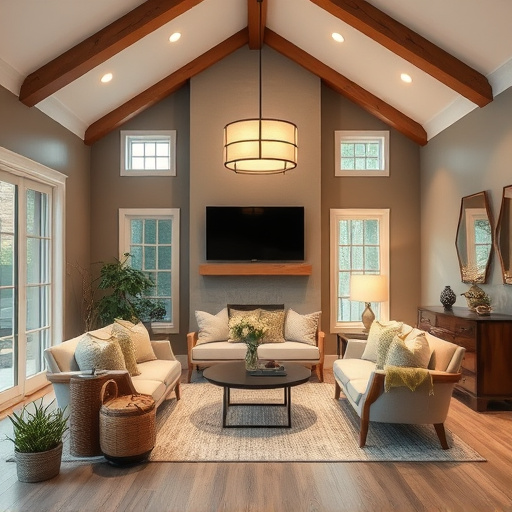Successful home renovation relies on thorough planning, clear objectives, and professional guidance to manage complexity, adhere to budgets, and maintain structural integrity. It's essential to assess financial capacity accurately, factor in a contingency for unexpected costs, and prioritize renovations that offer good return on investment. Choosing the right contractor with technical expertise, a shared vision, positive client feedback, and a track record of quality work is crucial. Material selection should focus on durability, appropriateness for local climate conditions, and moisture resistance in areas prone to water exposure to prevent future damage. Rigorous quality control at each renovation stage ensures proper installation and adherence to standards, adding value and longevity to your home. Effective budget planning, professional engagement, material choice, and quality oversight are key components for a successful home renovation project.
embarking on a home renovation project can significantly enhance your living space, yet avoiding common pitfalls is crucial for successful outcomes. This article guides you through key areas that require careful consideration to ensure your investment yields a satisfying result. We’ll explore the importance of defining clear objectives and expectations, managing finances wisely, selecting a reputable contractor, and making informed choices about materials. By heeding these insights on Home Renovations, you’ll steer clear of frequent errors and achieve a renovation that not only elevates your home but also brings lasting satisfaction.
- Understanding the Scope of Your Home Renovations: Setting Clear Objectives and Expectations
- Budgeting for Home Renovations: Allocating Finances Realistically to Avoid Financial Strain
- Choosing the Right Contractor: Vetting Professionals to Ensure Quality Workmanship and Project Completion
- Material Selection and Quality Control: Opting for Durable and Appropriate Building Materials for Long-Term Success
Understanding the Scope of Your Home Renovations: Setting Clear Objectives and Expectations

When embarking on home renovations, a clear understanding of the project’s scope is paramount for achieving successful outcomes. Homeowners often underestimate the complexity and extent of work required to complete a renovation. To avoid this pitfall, it’s essential to set clear objectives and expectations from the outset. Begin by identifying the primary purpose of your renovation—whether it’s to upgrade the aesthetics, increase functionality, or address necessary repairs. This focus will guide the design and planning stages, ensuring that every decision aligns with your vision.
To navigate this process effectively, consider hiring a professional designer or contractor who can help articulate your goals into a coherent plan. These experts are adept at forecasting potential issues and can offer valuable insights into cost-effective solutions that won’t compromise the integrity of your home renovations. Additionally, obtaining detailed quotes and references from multiple service providers will provide a realistic understanding of what to expect in terms of timelines and budget. By setting precise objectives and aligning them with practical expectations, you can steer your renovation project towards a successful completion that meets both your needs and your standards for quality.
Budgeting for Home Renovations: Allocating Finances Realistically to Avoid Financial Strain

When embarking on home renovations, one of the most critical aspects to consider is budget planning. Allocating finances realistically can prevent financial strain and ensure the project’s success. It’s not just about setting a total budget; it’s about understanding the scope of your renovation, researching costs associated with materials and labor, and accounting for unexpected expenses. Homeowners often underestimate the total cost due to unforeseen issues such as mold, structural damage, or outdated wiring that may come to light during demolition. To avoid these pitfalls, it’s advisable to add a contingency of 10-20% on top of your estimated budget. This buffer can absorb the costs of surprises and still allow for quality finishes without overextending your financial resources. Additionally, prioritize your renovation goals, focusing on high-impact areas that offer the best return on investment while avoiding the temptation to overspend on less critical aspects of the project. Prudent budgeting in home renovations is not just about allocating funds; it’s about making informed decisions that align with your financial capabilities and desired outcomes.
Choosing the Right Contractor: Vetting Professionals to Ensure Quality Workmanship and Project Completion

When undertaking home renovations, selecting the right contractor is a pivotal decision that can determine the success of your project. It’s not just about finding someone who can swing a hammer effectively; it’s about partnering with a professional who understands your vision and has the expertise to bring it to life. Begin by researching potential contractors, checking their track record for similar projects in your area. Look into their credentials, certifications, and experience in home renovations. A seasoned contractor will have a portfolio of work that showcases their craftsmanship and attention to detail. Furthermore, consider the contractor’s reputation within the industry and among past clients. Reviews, testimonials, and references are invaluable tools for assessing a contractor’s reliability and quality of workmanship.
Before finalizing your choice, engage in detailed discussions about project specifics, timelines, and budget constraints. A reputable contractor should provide transparent communication, clear documentation of the renovation plan, and a realistic timeline that aligns with your expectations. They should also be adept at managing subcontractors if specialized trades are required. Ensuring that the contractor is fully insured and bonded protects you from unforeseen events and guarantees that the work will be completed to a high standard. By carefully vetting professionals for your home renovations, you can secure a partnership that leads to quality workmanship, project completion on time, and ultimately, a satisfying transformation of your living space.
Material Selection and Quality Control: Opting for Durable and Appropriate Building Materials for Long-Term Success

When undertaking home renovations, the selection of materials and adherence to quality control are critical factors that can determine the longevity and success of your project. Choosing durable and appropriate building materials is not merely about aesthetics; it’s about ensuring the integrity and functionality of your renovated space over time. For instance, investing in high-quality insulation not only improves energy efficiency but also contributes to a more comfortable living environment. Similarly, selecting resilient flooring that withstands daily wear and tear will save you from costly repairs down the line. It’s imperative to research materials that suit your climate and intended use; for example, moisture-resistant options in bathrooms and kitchens can prevent mold growth and structural damage.
Quality control is an ongoing process that extends beyond mere inspection of materials. It involves regular checks at various stages of the renovation to ensure that every component is installed correctly and up to the specified standards. This diligence can prevent future complications, such as leaks or structural weaknesses, which may arise from subpar workmanship. Homeowners should work closely with their contractors to establish clear expectations and quality benchmarks. By doing so, they can avoid common pitfalls that lead to premature aging of renovated areas and ensure that the enhancements to their home contribute to its value and longevity. Attention to material selection and stringent quality control measures are the foundations upon which successful and enduring home renovations are built.
When embarking on home renovations, prudent planning and informed decision-making are key to achieving successful outcomes. This article has highlighted common pitfalls, particularly the importance of defining the scope of your project, managing finances effectively, selecting a reputable contractor, and choosing high-quality materials. By heeding these guidelines and focusing on clarity, financial acumen, professional vetting, and material integrity, homeowners can enhance their renovation experience, leading to a more satisfactory and durable result. Remember that thoughtful preparation in the stages of planning a home renovation can significantly contribute to its ultimate success. For insightful tips and best practices on home renovations, be sure to consider our comprehensive advice.


